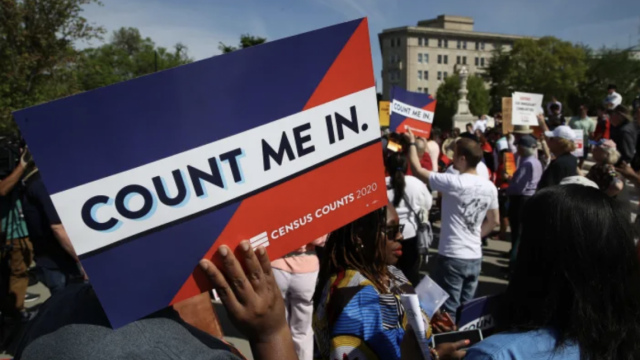
A federal judge said the allegations that the Trump administration wants a citizenship question on the 2020 census because it would advantage Republicans and white people are “serious,” but cautioned that he wouldn’t interfere with the upcoming Supreme Court decision on the matter.
Last week, newly released documents revealed that a Republican strategist known for redrawing electoral maps completed a study in 2015 that showed a census question “would be advantageous to Republicans and Non-Hispanic Whites.” Opponents of the citizenship question, who believe it will lead undocumented people to avoid answering the census and result in inaccurate data, contend this study formed the blueprint for the administration’s plan to add the question.
In court documents filed Monday, Department of Justice officials said the new allegations “border on frivolous,” and contended that the new evidence “reads more like the product of a conspiracy theorist than a careful legal analysis.”
But on Wednesday, in the Thurgood Marshall Courthouse in downtown Manhattan, District Court Judge Jesse Furman disagreed, instead speaking of the “seriousness of the allegations.”
“They are not, as the defendant says, ‘frivolous,’” said Furman.
The Republican strategist in question, Thomas Hofeller, died last year. His estranged daughter, who is progressive, subsequently found the documents on a hard drive inside a plastic bag after his death and passed them along to Common Cause, a nonprofit organization that pushes for open government and voting rights.
The court filings allege that Hofeller helped orchestrate and ghostwrite one of the draft letters that were sent from the DOJ to the Department of Commerce as an official request of the citizenship question, claiming that it was to be done in support of the Voting Rights Act and would help Latinos, despite Hofeller’s own study showing it would disadvantage Latinos.
The DOJ has said Hofeller’s study “played no role” in the department’s decision to introduce the citizenship question.
Judge Furman had blocked the government from putting the citizenship question on the census in January. The government appealed his decision and it’s now before the Supreme Court, which is due to decide on the case by the end of the month.
Furman said Wednesday that he was “acutely mindful” that the decision of whether the government should be allowed to ask a citizenship question is currently before the Supreme Court and that he had no intention of interfering with that case.
“I don’t want to do anything that would cross the line or would be seen as to cross the line,” said Furman.
Instead, he said there was “no apparent urgency,” and instead said more evidence and information was required before he could make any kind of decision. He gave the plaintiffs until July 12 to file more evidence.
After the hearing, John Freedman from Arnold & Porter, the law firm representing the New York Immigration Coalition and other progressive groups in court, said he appreciated that the judge took the new allegations seriously.
“We have uncovered evidence, strong evidence, that what is underlying the request for the citizenship question is racially discriminatory animus to entrench Republicans at the expense of minorities,” said Freedman. “We want to get the truth out. We think the Supreme Court, no matter what it decides, is going to be interested in what the truth is.”
Dale Ho, director of the ACLU Voting Rights Project and one Freedman’s colleagues on the case, said that the Supreme Court should be interested in what happened in New York’s District Court on Wednesday.
“Does the Supreme Court want to issue a ruling in the shadow of those kinds of allegations?” asked Ho. “That’s a question not for us to answer, but for the court.”
Originally published by BuzzFeed











